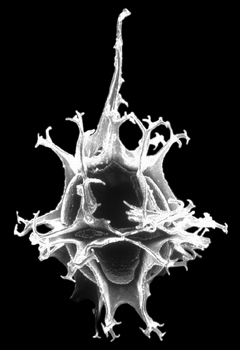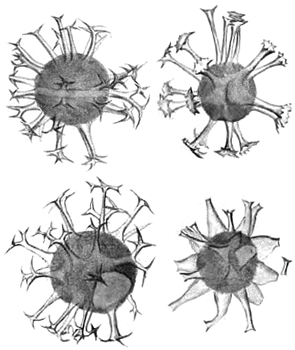Main Page
DINOFLAJ3
 |
 |
| Scanning electron microscope image of the Cenozoic chorate dinoflagellate cyst Spiniferella cornuta, a gonyaulacacean with a 1P archeopyle, parasutural crests, gonal processes with trifurcate endings, and a distinctive apical horn. Image provided by Sarah Damassa. | Species illustrated by Ehrenberg, 1837b as Xanthidium. Upper and lower left: "Xanthidium ramosum" (now Spiniferites ramosus); upper right: "Xanthidium tubiferum" (now Hystrichosphaeridium tubiferum); lower right: "Xanthidium bulbosum" (now Hystrichokolpoma bulbosum). |
WHAT IS DINOFLAJ3?
DINOFLAJ3 is a database system containing:
- An index of fossil dinoflagellates at generic, specific and infraspecific ranks. This information in DINOFLAJ3 is based on the latest edition of the Lentin and Williams Index (Williams et al., 2017). For a detailed description of the nomenclatural approach and format of DINOFLAJ3, refer to the Introduction.
- The classification of fossil and living dinoflagellates down to generic rank, where it is linked where possible with the Index information. The classification is based on Fensome et al. (1993b), but has not been updated for the present version.
- Other information and illustrations on fossil dinoflagellates as appropriate and available, including full reference information updated from the above sources and a glossary of terms.
Information is hyperlinked for convenient browsing. The Lentin and Williams Index edition equivalent to DINOFLAJ3 can be downloaded as a PDF document from the AASP-TPS website.
DINOFLAJ3 supersedes DINOFLAJ2 (Fensome et al., 2008), which in turn superseded DINOFLAJ v.1 (Fensome et al., 1998d; Geological Survey of Canada Open File 3653). Information will be updated periodically in the form of new formal versions of DINOFLAJ. In order to avoid confusion, it is recommended that the version always be indicated when citing DINOFLAJ. Past versions will be archived and kept available.
This new version of DINOFLAJ is released in conjunction with (and slightly later than) a new version of the Lentin and Williams Index (Williams et al., 2017). One difference in content between DINOFLAJ3 and the latest Index is that "nomenclatural novelties" are proposed in the latter and are treated as already accomplished in the former. We recommend that formal reference to the Index is preferable to reference to DINOFLAJ3 (i.e. Williams et al., 2017), but should reference to the DINOFLAJ3 database be required, we recommend the following:
Williams, G.L., Fensome, R.A., and MacRae, R.A., 2017. DINOFLAJ3. American Association of Stratigraphic Palynologists, Data Series no. 2. http://dinoflaj.smu.ca/dinoflaj3
The authors wish to acknowledge the support of the Geological Survey of Canada, Saint Mary's University, and AASP — The Palynological Society, and the American Association of Stratigraphic Palynologists Foundation.
Please note: The current version of the Dinoflagellate Index is the 2019 edition, which SUPERCEDES the Williams et al. 2017 Index. Until Dinoflaj4 is available, for up-to-date taxonomic status, please refer to the 2019 edition document available here.
MORE INFORMATION
- INTRODUCTION
- DINOFLAGELLATES
- RULES OF NOMENCLATURE AS APPLIED TO DINOFLAGELLATES
- FORMAT
- NOMENCLATURAL GLOSSARY
- USING DINOFLAJ3
- HOW DINOFLAJ3 WORKS
- FULL DOCUMENT VERSION
- ACKNOWLEDGEMENTS
- CONTACTS
CALL FOR DRAWINGS
DINOFLAJ3 currently contains simplified line drawings for over 900 generic, specific, and infraspecific entries. There are about 2200 "current" taxa (i.e. names currently in use in the literature). If you would like to contribute any drawings in digital form for your favourite taxon, read this formatting guide and contact us.